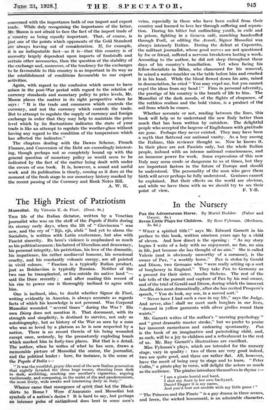The High Priest of Patriotism Mussolini. By Vittorio E. de
Fiori. (Dent. 6s.) This life of the Italian dictator, written by a Venetian journalist who was on the staff of the Popolo d'Italia during its stormy early days, when the lilt of " Giovinezza " was new,- and the cry of " Eja, eja, alala " had yet to alarm the Socialists, is written with Latin exuberance, but also with
Fascist sincerity. Its hero's violence is emphasized as much as his political acumen ; his hatred of liberalism and democracy, his personal integrity, his patriotism, his love of the dramatic, his impatience, his rather mediaeval humour, his occasional cruelty, and his constantly volcanic energy, are all painted in vivid colours. " Fascism is a typically Italian product, just as Bolsheviem is typically Russian. Neither of the two can be transplanted, or live outside its native land "— said the Duce recently ; and after reading this record of his rise to power one is thoroughly inclined to agree with
One is inclined, also, to doubt whether Signor de Fiori, writing evidently in America, is always accurate as regards facts of which his knowledge is not personal. Was Corporal Mussolini wounded " several times " during the War ? His own Diary does not mention it. That document, with its strength and simplicity, is destined to survive, not only as autobiography, but as history of the War as seen by a man who was as loved by a platoon as he is now respected by a nation. There is no record therein of his being wounded except once, seriously, by the prematurely exploding bomb which marked him in forty-two places. But that is a detail. The author, when he writes of what he has seen, draws a memorable picture of Mussolini the orator, the journalist, and the political leader : here, for instance, is the scene at the Popolo d'Italia:-- " It was the youthful, gypsy-like soul of the new Italian generation that nightly invaded the three huge rooms, shouting from desk to desk, scribbling, smoking one another's cigarettes, arguing vociferously, and composing, in the midst of din and pandemonium, the most lively, wide awake and interesting daily in Italy."
Whence came that resurgence of spirit that led the Black- shirts to Rome ? Were d'Annunzio and Mussolini but
symbols of a nation's desire ? It is hard to say, but perhaps an' intenser pulse of nationhood does beat in some men's
veins, especially in those who have been exiled from their country and learned to love her through suffering and separa- tion. During his bitter but unflinching youth, in exile and in prison, fighting in a Geneva café, marching handcuffed through Forli, or editing the Amalfi, Signor Mussolini' was always intensely Italian. During the defeat at Caporetto, the militant journalist, whose good nerves are not questioned by foe or friend, suffered a nervous breakdown lasting a week. According to the author, he did not sleep throughout these days of his country's humiliation. Yet when facing his fellow-Socialists in Milan, who clamoured for his removal; he seized a water-tumbler on the table before him and crushed' it in his hand. While the blood flowed down his arm, raised in denunciation, he cried " You may expel me, but you cannot expel the ideas from my head 1" Firm in personal adversity, the prestige of his country is the breath of life to him. The Mussolini of the dark moods, of the flights of eloquence, of the ruthless realism and the bold vision, is a product of the! soil from which he comes.
Whether accurate or not, reading between the lines, this book will help us to understand the new Italy better than much that has been written by outsiders. The delightful people who accepted the largesse of Englishmen with gratitude arc gone. Perhaps they never existed. They may have been a myth that flattered our national vanity. As a boy among the Italians, this reviewer thought so. Now he knows it. In their place are not Fascists only, but the whole Italian people, imbued with an intense national consciousness, and an immense power for work. Some expressions of this new Italy may seem crude or dangerous to us at times, but they are important factors in the future of Europe and should be understood. The personality of the man who gave them birth will never perhaps be fully understood. Geniuses cannot be explained. But their effects on the world are obvious, and while we have them with us we should try to see their point of view. F. Y-B.
•






























 Previous page
Previous page